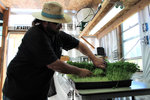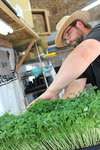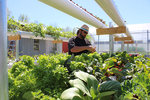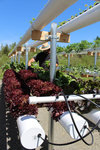



Rows of plastic pipes sprouting lettuces and sturdy greens at Jeromy Knight’s Toledo farm look straight out of a science fiction movie. But for Knight, this is his farming reality and one he believes will likely be embraced by more farmers in the coming years.
“I think this is a piece of the future of agriculture and I think it is what will get younger people interested in farming because they will see it isn’t all messy, hands in the dirt stuff,” Knight said.
Knight, the owner of Never Winter Farm, and his wife moved to their property on Gray Road in Toledo in 2014 from Newport, Oregon. Knight spent half of the time during his childhood living with his father in Centralia. As a youth, he was a member of Future Farmers of America and his first job was picking berries at many local farms when he was 12 or 13. While he said he never really considered himself an agricultural worker, later in life he felt drawn to farming.
The Knights began farming the Toledo property in 2017. The first crops they produced were microgreens grown in 10-inch by 20-inch soil flats inside an old shipping container. Their first foray into hydroponics was inspired by putting the microgreens on an automatic watering system and seeing how much water they saved, but also how well the plants thrived. They began to wonder if a farming method outside traditional in-ground growing might be the key to expanding their offerings.
“We wanted to add salad greens and bringing in that much soil, because we have terrible clay soil here, was going to be messy,” Knight recalled.
The couple experimented first with a floating raft system — a hydroponics system where plants are grown on a medium floating on top of nutrient-rich water. They also experimented with growing hydroponically in buckets before building their current system, three double rows of enclosed tubes that circulate water. The plants are inserted into holes along the length of the tube. Knight said one of the biggest benefits they have found to the less-traditional growing method is it extends their growing season by about 10 weeks total: They can typically plant about five weeks before it is safe to plant in-ground crops and their plants continue to produce for five weeks after other in-ground crops.
“We don’t have nearly the amount of pests and there’s no weeding,” he added.
Seeds for the hydroponics are planted in squares of rockwool, a wool-like medium created by melting rocks and minerals with heat and then spinning the liquid into a cotton candy-like material. Knight orders his rockwool material in squares with pre-punched holes in which seeds can be placed.
“We don’t bring any soil products into it because of the potential for contamination,” Knight explained. “Diseases like Pythium (root rot) can wipe out an entire crop.”
The plants in their rockwool squares are suspended in a system that is constantly circulating highly oxygenated water. Knight said the oxygen levels in the water are important so that the plants don’t drown. The system is gentler on the seedlings, with no transplant shock that can be experienced with in-ground crops. And the system of three tiers of growing surface means a space savings over more traditional planting methods.
“And we only use around 10 percent of the water that we’d use with in-ground crops,” Knight said. “We use in a month what we used in a day last year trying to grow in-ground crops.”
Knight said he has also found that some greens, especially Asian varieties such as bok choy, actually grow better in a hydroponic environment.
The upright nature of Never Winter Farm’s hydroponics system is also a boon for Knight personally. A former mechanic for General Motors, Knight had spinal surgery a couple of years ago, so traditional farming methods that require stooping and bending over are difficult for him. By comparison, harvesting greens out of his hydroponics system can be done standing upright.
“I’ll be able to continue farming well into old age this way,” Knight said.
Though microgreens and hydroponics will stay part of Never Winter Farm for the long haul, Knight said they are in the process of clearing half an acre of land to add in-ground crops. Root vegetables, such as carrots and radishes, cannot be grown hydroponically, so to be able to expand their offerings further they will have to do some traditional farming. Knight said he would eventually like to see Never Winter Farm become successful enough so that they could bring on a couple of employees to help with the farming but he never intends for the farm to grow too large.
“We’ll always be just a small farm serving our community,” Knight said.